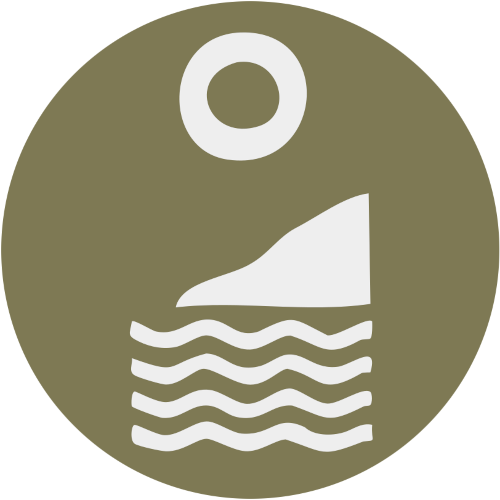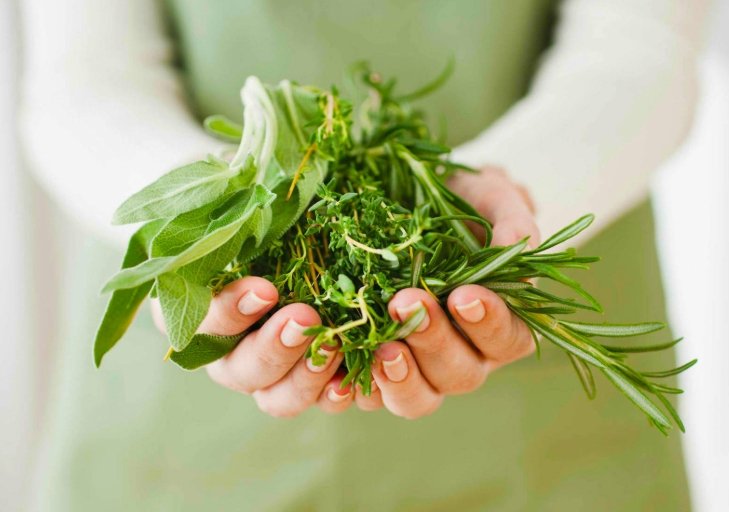Miraculous Mani Health Herbs
Here at ITM we love herbs. Ahead of a forthcoming seasonal series of our own articles looking at herbs, their uses and local foraging possibilities, here’s an interesting article by Christina Eleftheraki for Tharros today. We’ve translated the article below: –
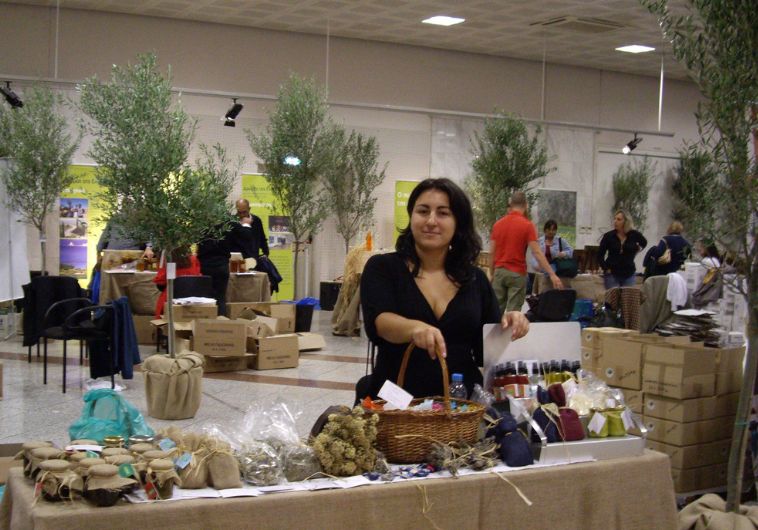
Miraculous herbs! Without lacking in the denial of expectations or even dangerous situations (due to incompatibility, inappropriate or excessive use), many of us have to share with enthusiasm experiences with plants and natural products that have helped us or got rid of various health problems and issues.
Especially those of us who have closer contact with the countryside and the village, our love for them is “subcutaneous”.
Angeliki, a great nature lover, sent me a photo and told me about Achilles (along with the myth, which wants Achilles to “calm his body after the hardships in the battles in Troy”) and how much good it did to her in physical pains associated with mild fibromyalgia, with… Bonus tried and tested linden balm-thyme recipe for childhood cough.
A friend from Northern Greece left me with her mouth open, recounting how an herb from a mountain in Messinia, carnavitosograss (with an indicative name for its action), miraculously and definitively eliminated ants from her baby. St. John’s wort is probably more widely known, with another good friend confirming to me that St. John’s wort oil is always available for spreading or drinking, for wounds, burns, joint pains, etc. in humans and animals.
And after I have submitted my own experience about sage (“attention raises pressure”, some people have pointed out to me) that I use systematically and I felt from the first day that it took away tons of weight from me from the body, at the same time eliminating symptoms that women have… A of a certain age, I give the “baton” to Fotini Bekri. She is from Mania, from Laconia, a naturalized Kalamatiani and is our man for this Reportage. Particularly active and creative, with a lot of knowledge and love for the beneficial plants, natural products and traditional heritage. At the same time, it is ready to generously and selflessly share what knows – and fortunately it is not the only one that works with this open way, in a place, such as Messinia, which is also blessed in terms of the richness and quality of the flora.
For Fotini there is something deeper in her relationship with her products beyond their practical use: “Do you remember our childhood when we went to visit beautiful courtyards and they treated us to spoon sweets and Other handmade goodies? You remember the joy of our soul from the simple and beautiful hospitality? What wonderful memories they gave us back then and we didn’t know it, but we experienced it. This is what I want to offer… Memories, beautiful smells of the herbs, traditional flavors from our rich land and Greek old hospitality.
I want to do it with my heart and I really don’t do it so much for the sake of money, as much as to relive through this beautiful years that were all more pure and especially our feelings”, confides to us our “guide”, who had previously operated in Kalamata a company and workshop (Maya) with natural products, herbal medicinal preparations and cosmetics. Now Fotini collaborates with travel agencies and groups, especially with Messinian Travellers, while prepares a series of new workshops focusing on herbs and is the subject of (e.g. she will show us the preparation of wax ointments). Any wants to know more, you can find her on facebook (Fotini Bekri), but through the pages of “Th” he already teaches us a lot…
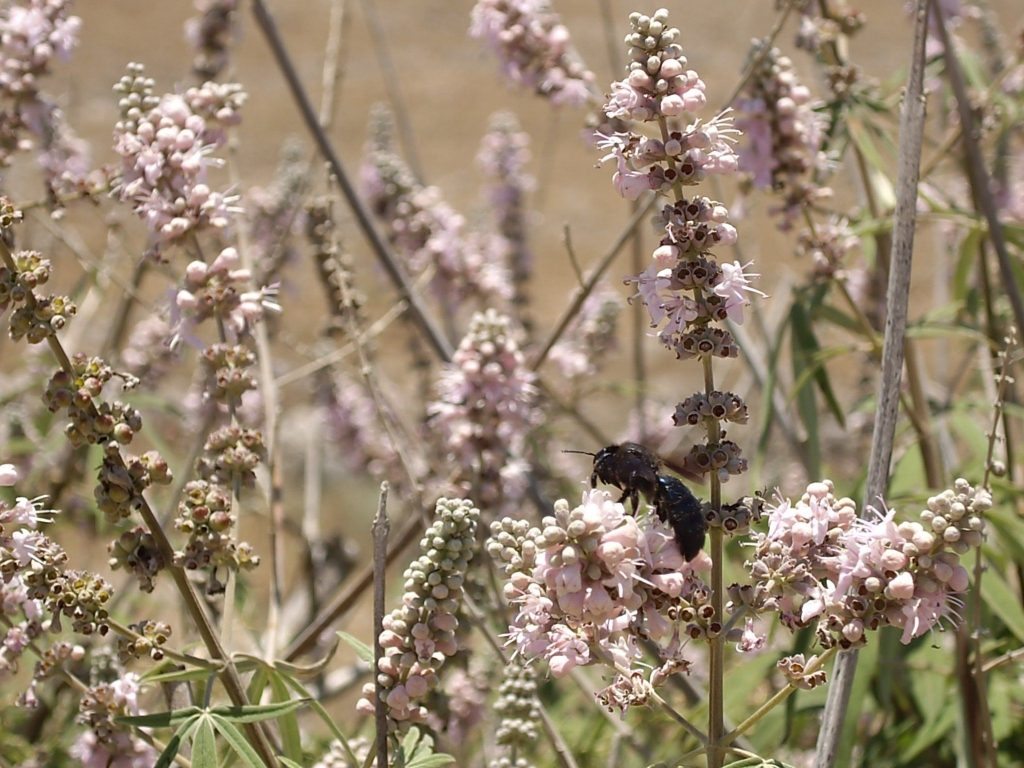
-Do you think that we can achieve health and well-being with herbs?
Certainly! Of course, each of us is different and special, but in general contexts we can pay attention to our body and mental health, spirit and matter. It is a matter of logic, moderation and balance. It has a lot to do with the whole, what psychological state we are in, whether we are full of inflammation due to our poor diet or because of stress that is overwhelming and deadly. In all these herbs and natural products they can help us a lot.
From then on, balance comes through small weekly actions, you have to know when to give space to rest, when to nourish the body right. Respect for the body – listen to it, not push it to the limits Nor should we let it “rust”. Peace of mind – through breathing, prayer, or a simple walk in nature. Positive mood and thoughts – because the way we think is reflected in our health.
Ultimately, health is not something static, it is an ongoing process Care. The more consciously we walk each day, the closer we come to A balance that we are all looking for.
-Can herbs replace medicines?
I’m not a doctor, and there are researchers who have spent their entire lives studying herbs—about their chemical composition, uses, properties, how they’re collected, and so much more—and there’s a lot more to discover. Based on these scholars and ancient usage, I will answer you that medicines can be replaced by herbs, after all, this is how pharmaceutical science began, from nature and its observation.
-We have heard of people with serious illnesses who left the herbal medicines with tragic results…
It is purely a personal responsibility and choice, some people can be helped by natural remedies and some cannot.
-How safe are herbs after all?
They are safe to a point. They also have side effects and it can be good for someone a certain herb, for another it can be indifferent or even bad, e.g. valerian which is an herb they use for sleep, it upsets me and I can’t sleep. There are people who have medicinal knowledge and can help in choosing for use. Also, we usually know more or less ourselves and what our body “lifts”. Let’s listen to our needs.
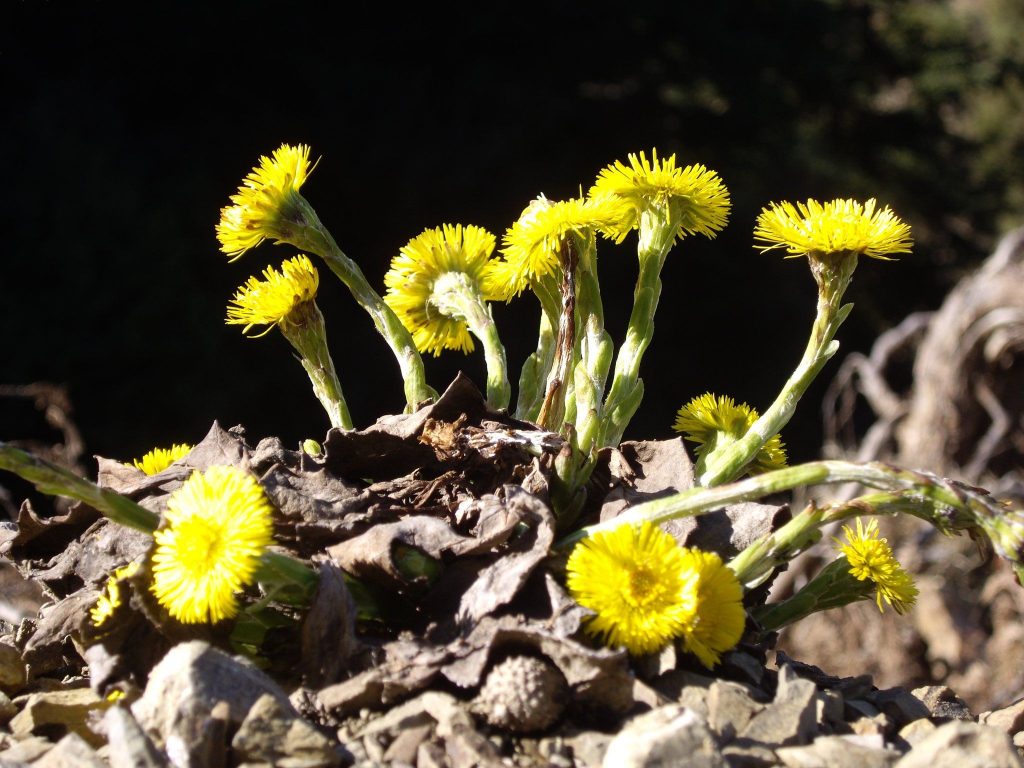
-Do you think that people in our region know, appreciate and use herbs?
There is no evidence from research, but locally and from my circle I understand that they know some. We have excellent oregano, sage, rosemary, chamomile, mountain tea, hypericum (St. John’s wort). These are used and appreciated quite a lot in Messinia. There is a great wealth of herbs in the Messinian land and in Laconia that I know, but many of them people do not know and I intend soon, in a new activity in the context of alternative tourism and experience, to do some walks of recognition and use along with Messinian tasting…
What we should not forget is that all the flora and fauna Risk. Apart from natural disasters, all the bad things that happen in the world they are made out of the greed of men. Thus, in herbs the collection must be done with respect and attention, taking the minimum that It is up to us so that the plant will exist next year, and until they find it and the next generations.
-Now we can easily find herbs and natural products on the internet…
It is useful for spreading herbs, but beware of scams. There is plenty of information on the internet when we want to buy an herb or preparation. There are also sources and research that we can find very easily and make a right decision regarding the purchase. The best thing of all, of course, is to trust local herbs and people who harvest them carefully.
-What has impressed you from your involvement with nature?
I have been impressed by the depth of the richness of plants (some are adaptogens, some have many uses for different diseases) and how much we can learn. It is a constant search and exploration. I have been involved in food collection since I was a young child in Mani, where I grew up. I was very blessed that my whole environment was restless, everything was made with passion by my family and those around us. All the things of the house, soaps, pickles, spoon sweets from fruits, clothes, carpets, blankets, knitting, beehives in wise stone constructions and not today’s wooden beehives… And of course, everything in its time, and this was a matter of survival, greenhouses were not widespread.
-So, that’s how your interest in herbs began…
It was passed down into my DNA, a natural continuation for me from the older generations. My grandfather Kalapothakis, who was born in 1898 in Krialianika, Mani, a settlement near Areopolis, used to heal with recipes from many herbs, people and animals. In his family home there is still this stone apiary from 1890. He had an excellent knowledge of herbs and used them in every occasion, since medicines were not widespread or were very expensive. Thus, in the old days, people did it out of necessity, but also out of their direct contact with nature, since they survived from it and were wiser in it. All the knowledge they had was passed down from generation to generation and, of course, the main source was observation. I saw this in practice. For example, one of my dogs had been poisoned by something and did well by eating all the verbena I had in my pot, or another who was seriously ill, I saw that he was eating young fig leaves. At that time I did not know that fig leaves were used for medicinal tea, but I saw that the dog did well and the fig leaves relieved his pain.
All this legacy has been supplemented by my own observations and experiments, but it also took a lot of reading, and of course her journey knowledge continues…
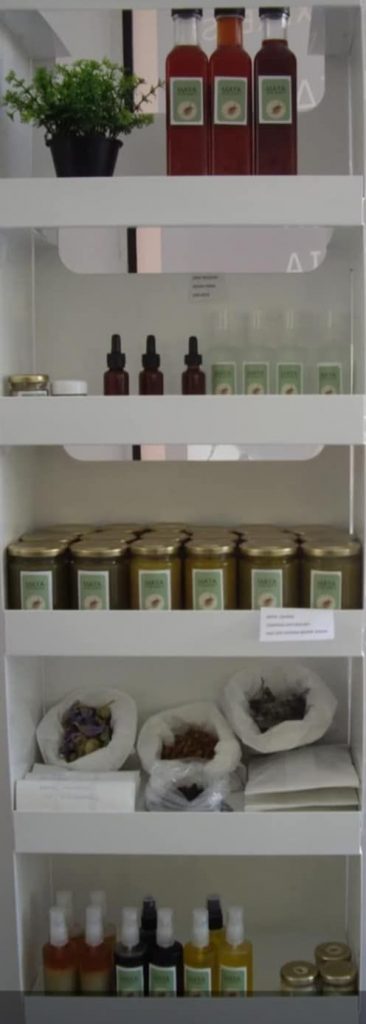
What are your favorite natural “medicines”:
“The top 3 for me, the ones I use every day, are rose, oregano and salt. The tame rose, but also the wild rose is also an excellent herb. It balances the body in all depths: physical, mental, cerebral. Personally, I use flower water as a cosmetic and petals as tea.
Oregano is my pharmacy in all its forms and salt (the salt flower from Mani) is my energy, with vitamins, trace elements, metals, electrolyte strong!
At some point I experienced high pressure. The doctor told me to avoid the salt, while in order to regulate it with garlic, he told me that I had to eat… Tons. Eventually, it turned out to be stressful and everything went back to normal when I drove toxicity out of my life. At the same time, they continued to eat salt – and We are talking about the processed, which the doctors are probably right -, but the flower salt has 33 trace elements and vitamins, and not only should it not be We get out of our lives, but let’s all put it in!
-Would you say that you changed your life with the help of natural products?
Change for the better is a continuous process, but I will dare to say yes, because it was another step to get to know the creator of everything and to love him for the way he has made us and all of nature. With a little observation you see all this grandeur that surrounds us, the balance, the beauty and the joy. As you walk along a path in the forest you hear the chirping, the water flowing, the smells of herbs, you can gather your food, e.g. mushrooms (only if we know them very well!), greens, fruits, etc. Do you feel calm and joyful, is it possible that your life will not change? I wish all people to be able to find their inner peace.
—
For tea or food, pharmaceuticals or cosmetics…
With the footnote “very briefly, because many studies have been done and we can say infinite things”, Fotini Bekri also mentioned the following, with the promise that we will come back with other tributes, with various aspects of beneficial plants and herbs.
-Wild olives: use leaves and oil, tea, food cosmetic (protects heart (brain, anti-inflammatory)
-Sage: whole plant tea, tincture, food cosmetic (the Arabs say garden with sage equals eternal life, meaning that it is polydrug)
-Wicker: tea. Only for women, in men it causes sterilization, especially Fruits (menopause, premenstrual syndrome)
-Arthromolocha: the whole plant with expectorant properties, becomes tea and syrup
-Rosemary: food, tea, flavoring, cosmetic (very good for hair, tones the body improves mood)
-Nettle: delicious in omelettes and tea. Detoxifies the liver
-Cough: an herb with traditional use for cough relief and other respiratory diseases. Its main properties are soothing and expectorant action, as well as mild diuretic action. We find it in liquids Parts
-Trivoli: it is made into tea and is a very good herb for men, for fertility and muscle mass growth
-Kolitsis: as a tea it is used for detoxification, diuresis
-Capers: beloved! Food, tea, cosmetic, anti-aging and more
-Oregano is also loved, a powerful antibiotic, antibacterial, antifungal, aromatic, in food, cosmetic, tea, tincture, essential
-And finally, useful tips from Fotini that look alike, but don’t They only concern beauty: “We should not use heavy commercial creams. Depending on the type of skin after cleansing, rose water helps a lot and masks of yogurt, honey and fruit or every time we eat a peach, e.g. left over from the peel we can pass it on our face with circular upward movements, from the jaw and towards the forehead, or an ice cube in the same way Made from tea of our favorite herb. This is a general rule for all skin types, then there are specialized recipes for every type.”
General principles of
herbal use The use of herbs requires knowledge, information and special attention. For safety reasons, we avoid concomitant use with medications without doctor’s advice (e.g. hypericum with antidepressants, grapefruit with cardiac medications).
In any case, we do not exaggerate: more quantity is not means better result!
-Break in use
It is advisable not to use the same herb continuously for large periods, because our body gets used to it and “lazy” – this It is because we have self-improvement. A general rule is: 3–4 weeks of download, after 1 week break. For more potent herbs (e.g. roots, Peels) is often recommended 15 days intake, 5 days off.
What we achieve by discontinuing use:
1. The body needs cycles: When we take the same herb over and over again, the organism gets used to it and its action decreases. The break gives the opportunity to become sensitive to the action of the plant again.
2. Avoid overload: Herbs have active substances (alkaloids, essential oils, tannins, etc.). If we take them all the time, the organization works monotonous on a road (e.g. diuresis, relaxation, stimulation) and there may be imbalance. The break protects the liver, kidneys and their general detoxification mechanisms.
3. Reminder to the body to improve itself: Herbs do not they are drugs that “replace” the body; are supporters. Giving breaks, we let the organization “remember” that it can do the job and on its own (self-regulation).
4. Practical reason: If we take a lot of herbs all the time, it is difficult We understand which one ultimately helps us. With shooting cycles, we can clearly see which has an effect and in what.
Extraction Methods
-Infusion for leaves, flowers, tender places: pour the herb into hot water Just before boiling, cover, leave for 5–15 minutes, then strain
-Decoction for roots, barks, Seeds: Boil the hard parts of the plant for 5–15 minutes, cover, and leave a little bit to “pull”.
Important: always cover the container during extraction, so that they do not get lost essential oils. Other processes are distillation for essential oils and the flower water of the herbs.
Herbal Blend
Yes, it does, and it is a traditional practice.
Usually:
1 “main” herb (for the main action) along with 1–2 “complementary” that enhance the action and 1 “harmonizing” (for taste/calmness in the mixture, e.g. mint, verbena, chamomile).
It is advisable not to exceed 3–4 herbs per mixture, so that we know how each one works and to avoid exaggerations.
Dosage
Usually 1 tablespoon of dried herb (or 2 teaspoons) in a cup of water. For fresh herb, about twice the amount.
Consumption hours
Stimulating herbs (e.g. nettle, rosemary, green tea) → morning/noon.
Herbs that calm (e.g. verbena, lemon balm, chamomile, linden tree) → afternoon/evening.

